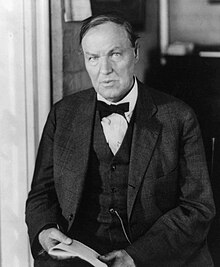
Back كلارنس دارو Arabic كلارنس دارو ARZ Clarence Darrow Czech Clarence Darrow Danish Clarence Darrow German Clarence Darrow Spanish Clarence Darrow Estonian کلارنس دارو Persian Clarence Darrow French קלרנס דרו HE
Clarence Darrow | |
|---|---|
 Darrow in 1922 | |
| Member of the Illinois House of Representatives from the 17th district | |
| In office 1903–1905 | |
| Preceded by | Albert Glade |
| Succeeded by | Edward W. Gillispie |
| Personal details | |
| Born | Clarence Seward Darrow April 18, 1857 Farmdale, Ohio, U.S. |
| Died | March 13, 1938 (aged 80) Chicago, Illinois, U.S. |
| Political party | Independent |
| Other political affiliations | Public Ownership (1903–1905) |
| Spouses | Jessie Ohl
(m. 1880; div. 1897)Ruby Hammerstrom (m. 1903) |
| Children | 1 |
| Relatives |
|
| Alma mater | Allegheny College University of Michigan |
| Occupation | Lawyer |
| Signature | |
Clarence Seward Darrow (/ˈdæroʊ/; April 18, 1857 – March 13, 1938) was an American lawyer who became famous in the 19th century for high profile representations of trade union causes, and in the 20th century for several criminal matters, including the Leopold and Loeb murder trial, the Scopes "monkey" trial, and the Ossian Sweet defense. He was a leading member of the American Civil Liberties Union and a prominent advocate for Georgist economic reform. Darrow was also well known as a public speaker, debater, and writer.[1]
Darrow is considered by some legal analysts and lawyers to be the greatest lawyer of the 20th century.[2][3][4] He was posthumously inducted into the Trial Lawyer Hall of Fame.[5] Called a "sophisticated country lawyer",[6] Darrow's wit and eloquence made him one of the most prominent attorneys and civil libertarians in the nation.[7]
- ^ "Clarence Darrow | American Lawyer & Civil Rights Activist | Britannica". www.britannica.com. September 29, 2023. Retrieved September 30, 2023.
- ^ Solovy, Jerold S.; Byman, Robert L. (1999). "The Timeless Litigator". Litigation. 26 (1): 12–18. ISSN 0097-9813. JSTOR 29760099.
- ^ Uelmen, Gerald (January 1, 2000). "Who Is the Lawyer of the Century". Loyola of Los Angeles Law Review. 33 (2): 613. ISSN 0147-9857.
- ^ "Clarence Darrow". Trial Lawyer Hall of Fame. Retrieved November 16, 2023.
- ^ "Clarence Darrow". Trial Lawyer Hall of Fame. Retrieved November 17, 2023.
- ^ Linder, Douglas O. (1997). "Who Is Clarence Darrow?" Archived March 10, 2009, at the Wayback Machine, The Clarence Darrow Home Page
- ^ Hakim, Joy (1995). War, Peace, and All That Jazz. New York, New York: Oxford University Press. pp. 44–45. ISBN 0-19-509514-6.